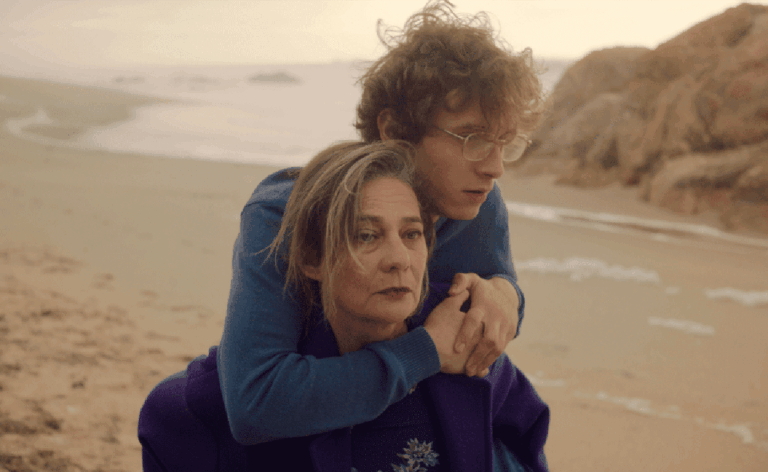The first Portuguese film to win the coveted ‘Audience Award’ at the Austin Film Festival, filmmaker Antonio Sequeira’s “Autumn” takes viewers on a journey through literal seasons of change in life. It follows a family residing in the countryside as their oldest son Thomas, departs for London to pursue higher studies. He leaves home on his 18th birthday, which doesn’t make it easier on the close-knit family.
Through identifiable characters and scenarios viewers can relate to, the movie showcases changing family dynamics. Some are major upheavals, while others are minor in nature. Initially the homesick young man (Tomás, played by Salvador Gil) misses more than home, such as his father Otávio’s (Miguel Frazão) politically incorrect jokes and his mother Susana’s (Elsa Valentim) boring anecdotes from work. However, soon enough he grows out of it. He chooses to miss out on family traditions—such as Easter egg hunts—he once treasured in his childhood. Possessions like a pair of bongo drums (the film opens with Tomás turning the house upside down searching for these) which held value are traded away for a newfound freedom. Along with his personal preferences, his religious beliefs too undergo a change that’s a far cry from the Catholic upbringing enforced upon him and his younger sibling Belinha (Beatriz Frazão) by their mother.
Handling Miscommunication and Poles-Apart Characters
The focus of “Autumn” isn’t solely on the men in the family either, as it also explores the inequality faced by the women. It focuses on Belinha’s forced smiles when her father cracks one of his misogynistic jokes or her mother’s attempts to be self-sufficient, undermined by the unsupportive Octavio who avoids confrontation. Like her brother, Belinha also harbours a dream to move away for higher studies, but her passion is deemed impractical in an unstable economic situation. Thus, both mother and daughter are stuck between a rock and a hard place, held back from living their individual desires. Later, Belinha—who shares all her secrets with her older brother and considers him as a mentor—grows insecure of his new girlfriend Gaya (Krupa Narci Givane). She perceives her as a replacement and a threat to this bond. Susana’s indirect favouritism of the siblings also feeds into these growing insecurities.
“Autumn” also navigates miscommunication between the poles-apart family members. Tomás is conflicted between driving fast or slow.’ He wants to live life on his own terms but finds he must follow rules when he’s under the same roof as his parents. This results in awkward family dinners and eventually no space for meaningful conversations when time runs out and he has to return to London once again. Unlike Susana—who is openly sentimental upon his return, eagerly awaiting his arrival at the station platform—on the contrary, Otávio is stoic and represses his emotions due to an ingrained ‘men don’t cry’ mentality. Suffocated and frustrated by his father’s idealistic but misplaced views of machismo, Tomás confides in Belinha that he’s thinking of ditching his geeky identity for the frat boy persona when he joins university.
Sympathy for its Imperfect Characters

The symbols and colours of “Autumn” also play a pivotal role to reflect the evolution of its characters. London-bred Gaya’s pink sweater sticks out amidst the consistent blue and yellow hues of the Portuguese countryside setting, clashing with the interiors of the home, too. Even the befitting title of the movie itself which alludes to a season where ripe green leaves transition into a faded shade of yellow and bid goodbye to the branches. This is much like young Belinha and Tomás, growing up and out of rules that bind them to home. We also see Tomás’ quest for validation through his efforts to show off his first tattoo (equated to rebellion) to a father who never notices him.
Despite their’ shortcomings, “Autumn” never sidelines the plight of Otávio or Susana and is sympathetic towards them. It depicts Susana’s burnout at her job due to the tech takeover which lessens her bond with the patients at the clinic she works at. Meanwhile, it also draws a parallel to her feeling purposeless as a mother now that her children have flown the nest. A flashback also portrays a grey-haired Susana carrying a grown Tomás on her back while a laidback and younger version of Otávio drifts away from her. It signifies the onset of old age; she woefully wishes for the return of youth and longs for freedom from the fatigue of her responsibilities as a parent.
In line with Susana, the oblivious Otávio too finally finds his way into contemplation as everything and everyone around him undergoes an upheaval. Well-immersed in his own bubble along with stereotypical views, he too needs to accept that his limited time as a free-spirited adventurer must come to an end. Hope isn’t entirely lost for the pair, however, as a scene features Susana and Otávio dancing together as they gradually learn to be on the same page and tolerate each other in the same room. They simultaneously fall in love all over again while living selflessly, rather than vicariously through their children.
Hope Amidst Change

The soundtrack feels apt, with “Saudade Saudade” (translation: yearnings/nostalgia) by Portuguese singer and Eurovision contestant MARO during the movie’s climactic portion. It particularly serves as a befitting send-off for Tomás while amplifying its overall tone and themes, too. Lastly, the ensemble of Beatriz Frazao, Elsa Valentine, Miguel Frazão, Sara Barradas, Ricardo de Sá, Salvador Gil, and Krupa Givane impress with their respective performances.
Overall, “Autumn” demonstrates that families are far from perfect, but there’s still hope if one only takes the time out to listen and work together on the problems. After all, it isn’t too late for one final dance with the ones you love and those who stand by you through thick and thin, through every changing season.

“Autumn” will be available digitally on Amazon Prime Video, Apple TV, Sky Store from June 2


